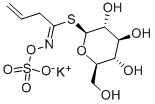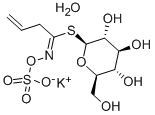SINIGRIN
- CAS NO.:3952-98-5
- Empirical Formula: C10H17NO9S2.K
- Molecular Weight: 397.46
- MDL number: MFCD00006616
- EINECS: 223-545-8
- SAFETY DATA SHEET (SDS)
- Update Date: 2024-11-19 23:02:33

What is SINIGRIN?
The Uses of SINIGRIN
Sinigrine, is a glucosinolate which is found naturally in Cruciferae including the genus Brassica. When enzymatically hydrolysed, Sinigrine yields isothiocyanates and give a pungent taste. Both Sinigrine, and isothiocyanates, have been shown to have anticancer activity as well as antifungal and antibacterial properties.
The Uses of SINIGRIN
Sinigrin, a glucosinolate, is used as a systrate to identify, differentiate and characterize myrosinase(s)/thioglucoside glucohydrolase(s)/thioglucosidase(s). Sinigrin is used as a reference material in procedures for the isolation and identification of glucosinolates.
What are the applications of Application
(?)-Sinigrin is a substrate for thioglucosidase
Definition
ChEBI: An alkenylglucosinolate that is the conjugate base of sinigrin.
Biochem/physiol Actions
A β-D-thioglucopyranoside occurring in black mustard seeds and horseradish root. Substrate for thioglucosidase.
Properties of SINIGRIN
| Melting point: | 128 (dec.)(lit.) |
| storage temp. | Hygroscopic, -20°C Freezer, Under inert atmosphere |
| solubility | DMSO (Slightly), Methanol (Slightly), Water (Slightly) |
| form | Solid |
| color | White |
| optical activity | [α]20/D 17±1°, c = 1% in H2O |
| Water Solubility | almost transparency |
| Merck | 14,8545 |
| Stability: | Hygroscopic |
| CAS DataBase Reference | 3952-98-5 |
Safety information for SINIGRIN
| Signal word | Warning |
| Pictogram(s) |
 Exclamation Mark Irritant GHS07 |
| GHS Hazard Statements |
H302:Acute toxicity,oral H315:Skin corrosion/irritation H319:Serious eye damage/eye irritation H332:Acute toxicity,inhalation H335:Specific target organ toxicity, single exposure;Respiratory tract irritation |
| Precautionary Statement Codes |
P280:Wear protective gloves/protective clothing/eye protection/face protection. P310:Immediately call a POISON CENTER or doctor/physician. P305+P351+P338:IF IN EYES: Rinse cautiously with water for several minutes. Remove contact lenses, if present and easy to do. Continuerinsing. |
Computed Descriptors for SINIGRIN
New Products
(S)-3-Aminobutanenitrile hydrochloride 4-Methylphenylacetic acid N-Boc-D-alaninol N-BOC-D/L-ALANINOL Tert-butyl bis(2-chloroethyl)carbamate 3-Morpholino-1-(4-nitrophenyl)-5,6-dihydropyridin- 2(1H)-one Furan-2,5-Dicarboxylic Acid Tropic acid 1-Bromo-3,5-Di-Tert-Butylbenzene S-2-CHLORO PROPIONIC ACID ETHYL ISOCYANOACETATE 2-Bromo-1,3-Bis(Dimethylamino)Trimethinium Hexafluorophosphate 4-IODO BENZOIC ACID 3-NITRO-2-METHYL ANILINE 1-(2,4-DICHLOROPHENYL) ETHANAMINE (2-Hydroxyphenyl)acetonitrile 4-Bromopyrazole 2-(Cyanocyclohexyl)acetic acid 4-methoxy-3,5-dinitropyridine 1-(4-(aminomethyl)benzyl)urea hydrochloride 2-aminopropyl benzoate hydrochloride diethyl 2-(2-((tertbutoxycarbonyl)amino) ethyl)malonate tert-butyl 4- (ureidomethyl)benzylcarbamate Ethyl-2-chloro((4-methoxyphenyl)hydrazono)acetateRelated products of tetrahydrofuran








You may like
-
 Sinigrin CAS 3952-98-5View Details
Sinigrin CAS 3952-98-5View Details
3952-98-5 -
 (−)-Sinigrin hydrate, ≥99% CAS 3952-98-5View Details
(−)-Sinigrin hydrate, ≥99% CAS 3952-98-5View Details
3952-98-5 -
 (−)-Sinigrin hydrate CAS 3952-98-5View Details
(−)-Sinigrin hydrate CAS 3952-98-5View Details
3952-98-5 -
 Sinigrin Potassium Salt Reference Standard Grade CAS 3952-98-5View Details
Sinigrin Potassium Salt Reference Standard Grade CAS 3952-98-5View Details
3952-98-5 -
 1975-50-4 98%View Details
1975-50-4 98%View Details
1975-50-4 -
 2-HYDROXY BENZYL ALCOHOL 98%View Details
2-HYDROXY BENZYL ALCOHOL 98%View Details
90-01-7 -
 14714-50-2 (2-Hydroxyphenyl)acetonitrile 98+View Details
14714-50-2 (2-Hydroxyphenyl)acetonitrile 98+View Details
14714-50-2 -
 118753-70-1 98+View Details
118753-70-1 98+View Details
118753-70-1